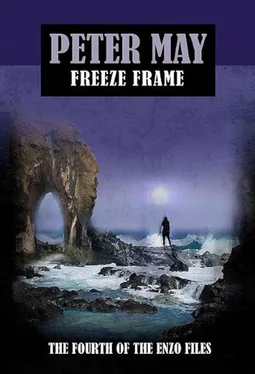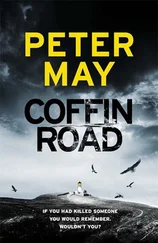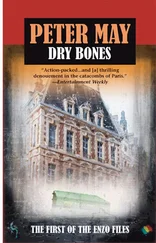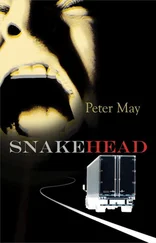Peter May - Freeze Frames
Здесь есть возможность читать онлайн «Peter May - Freeze Frames» весь текст электронной книги совершенно бесплатно (целиком полную версию без сокращений). В некоторых случаях можно слушать аудио, скачать через торрент в формате fb2 и присутствует краткое содержание. Жанр: Классический детектив, на английском языке. Описание произведения, (предисловие) а так же отзывы посетителей доступны на портале библиотеки ЛибКат.
- Название:Freeze Frames
- Автор:
- Жанр:
- Год:неизвестен
- ISBN:нет данных
- Рейтинг книги:5 / 5. Голосов: 1
-
Избранное:Добавить в избранное
- Отзывы:
-
Ваша оценка:
- 100
- 1
- 2
- 3
- 4
- 5
Freeze Frames: краткое содержание, описание и аннотация
Предлагаем к чтению аннотацию, описание, краткое содержание или предисловие (зависит от того, что написал сам автор книги «Freeze Frames»). Если вы не нашли необходимую информацию о книге — напишите в комментариях, мы постараемся отыскать её.
Freeze Frames — читать онлайн бесплатно полную книгу (весь текст) целиком
Ниже представлен текст книги, разбитый по страницам. Система сохранения места последней прочитанной страницы, позволяет с удобством читать онлайн бесплатно книгу «Freeze Frames», без необходимости каждый раз заново искать на чём Вы остановились. Поставьте закладку, и сможете в любой момент перейти на страницу, на которой закончили чтение.
Интервал:
Закладка:
The skin around Gueguen’s eyes crinkled with consternation. “How?”
“Because the natural sweat present on the fingers reacts with the metal of the casing, in effect engraving the fingerprint invisibly into it. Sweat is a complex mix of water, inorganic salts like sodium chloride, and other oily compounds. These have a corrosive effect on the brass. And, in fact, while the heat generated by the process of firing the bullet will have obliterated any normal prints, it will actually have burned the sweat print more deeply into the metal. My colleague, Doctor Bond, has invented a technique for making those engraved prints visible.” Enzo smiled. “Deceptively simple, really. He applies a 2,500 volt electrostatic charge, then dusts the casing with a fine carbon powder which clings to the areas of metal corroded by the sweat. And, bingo! You have a fingerprint. Unfortunately the technique has not yet been granted a patent, so the only person in the world who can carry out this test is Doctor Bond himself. Which is why we have to send everything to him.”
The gendarme stared at him, almost open-mouthed. “That’s amazing, monsieur. The number of cold cases that could solve…”
Enzo nodded. “It’s a technique that can also be used for recovering fingerprints from exploded terrorist bombs. A conclusive way of catching the bomb makers. It’s going to revolutionise crime detection.” He stood up. “But for the moment, let’s just hope that it nets us Killian’s murderer.” He reached out a hand to shake Gueguen’s, then lifted his umbrella.
As he stepped from the boat to the pontoon he saw, through the mist of rain, the lights of the ferry approaching the harbour. The wind whipped at his umbrella, making it difficult to hold. He tipped it in the direction from which the wind blew, and teetered unsteady back toward the quayside. He was climbing the steps to the quay just as the ferry slipped through the narrow harbour entrance, a blast of its horn ringing around the little enclosed bay.
Fifteen minutes later, as he gazed from the rain-smeared window on the passenger deck, he saw Adjudant Gueguen emerging from La Boheme to make his way back to shore, Enzo’s Tupperware box tucked beneath his jacket.
It was, Enzo supposed, a long shot. The killer might have worn gloves when he loaded the gun. Or the magazine could have been preloaded. In either of those circumstances, any print recovered from the shell casing would not belong to the man who murdered Adam Killian.
He turned away from the window and found a seat, and when finally the boat had completed its turn in the relatively calm waters of the harbour and headed out again into the strait, he set his sights for the moment not on who murdered Killian, but why. The answer to that, he hoped, was waiting for him in Paris.
Part Four
Chapter Thirty-Two
Paris, France, November 2009
The Simon Wiesenthal Centre in the Rue Laugier was located in a four-story brick building opposite the narrow Rue Galvani. A stone-faced ground floor was accessed through an arched doorway. An equally stone-faced Gerard Cohen met Enzo in the entrance as arranged. He was a small man, clutching a large leather briefcase, and was completely bald. He had a lined, almost wizened face and small, black, suspicious eyes. He wore a dark blue suit that had seen better days. Enzo noticed how under the jacket the cuffs of his white shirt were frayed. His collar was crumpled, and his tie too tightly tied. He had a small, neatly trimmed silver moustache above too-full lips that were purple and shiny wet. Enzo thought that he must be at least seventy-five.
He shook Enzo’s hand with a firm but brief grip. Enzo reached for the door to hold it open for him. But he shook his head. “I no longer have an office here, monsieur.” He nodded along the street toward the Cafe Liberte on the far corner of the Rue Guillaume Tell. “But you can buy me a drink.”
He walked with quick, shuffling steps along the street, almost running, and Enzo had to work at keeping up with him. It was still dry in Paris, and mild. But a leaden sky presaged the coming rain that Enzo’s train had earlier outrun. They passed the Shri Ganesh Indian restaurant with its maroon canopies and crossed the street diagonally to the opposite corner, provoking a flurry of car horns.
Cohen took a seat by the window and Enzo slipped into a chair opposite. The cafe was also a tabac and sold lottery tickets, and so there was a constant stream of clients. It was noisy, customers barracking at the bar, the rumble of diesel engines out in the street, and the tinny, wasp-like buzz of motor-scooters whizzing past. Ideal for an exchange of confidential information. The place smelled of old alcohol and fried onions, but the smokers stood out on the sidewalks these days, so they were spared the fugg.
Enzo could see from the nicotine stains on his fingers that Cohen was also a smoker. He could smell the stale smoke that clung to his clothes but wasn’t certain if it was the enforced abstinence from cigarettes or some deeper insecurity that made him so nervous. The one-time Wiesenthal investigator kept glancing from the window toward the quincaillerie-droguerie opposite, as if there might be someone watching them from across the street. He constantly interlinked and unlinked his fingers on the table in front of him.
Enzo felt unsettled by his apparent edginess. “Is there any reason for us to be concerned about meeting like this?” he asked.
“Not that I know of, monsieur. But there are usually eyes on us.”
Enzo frowned. “Whose eyes?”
“The Nazis.” The word rolled off his tongue almost casually.
Enzo nearly laughed. “Surely those days are long gone? The people you went after following the war are dead or too old to be a threat.”
“Yes. But there is a new generation, monsieur. And they regard the people we hunted as heroes. And those who hunted them as vermin to be exterminated.”
The barman came to their table and they ordered beers.
Cohen fixed him with a penetrating stare. “So. How can I help you?”
“You know how you can help me. I want to know what you and Adam Killian wrote about in your exchange of letters. Why he came to see you.”
Cohen scratched his chin, and an alien-like tongue darted out to pass quickly over his already wet lips before withdrawing again behind yellowed teeth. He looked at Enzo pensively. “I checked you out, monsieur. You have quite a presence on the Net.”
“Yes,” Enzo agreed ruefully. “Unfortunately I do.”
“It’s where I live these days.”
Enzo frowned.
Cohen explained. “On the Internet. I spend most of my waking hours online. It’s incredible, you know, just how much Nazi propaganda there is out there masquerading as fact, how many sites there are where the neos meet to exchange ideas and intelligence. They are stitching themselves back into the fabric of our society, without our even being aware of it.”
Enzo looked at him speculatively, wondering if he was just another paranoid conspiracy theorist, or whether there was any truth in his assertions. “Are you going to tell me about Adam Killian or not?”
Their beers arrived, and Cohen took a long pull at his, holding his glass in a hand that shook a little as he raised it to his mouth. “Did you ever hear of a man called Erik Fleischer?”
Enzo shook his head.
“He was a young Bavarian doctor, newly qualified when war broke out. He was taken under the wing of a certain Aribert Heim, an SS doctor assigned initially to the concentration camp at Mauthausen in Austria. You probably know Heim better by his nickname. Doctor Death.”
Enzo raised an eyebrow in surprise. He had been vaguely aware of newspaper articles about Nazi hunters closing in on the last surviving Nazi on the most-wanted list from World War Two. The press had called him Doctor Death, and he was rumoured to be still alive and hiding somewhere in Patagonia.
Читать дальшеИнтервал:
Закладка:
Похожие книги на «Freeze Frames»
Представляем Вашему вниманию похожие книги на «Freeze Frames» списком для выбора. Мы отобрали схожую по названию и смыслу литературу в надежде предоставить читателям больше вариантов отыскать новые, интересные, ещё непрочитанные произведения.
Обсуждение, отзывы о книге «Freeze Frames» и просто собственные мнения читателей. Оставьте ваши комментарии, напишите, что Вы думаете о произведении, его смысле или главных героях. Укажите что конкретно понравилось, а что нет, и почему Вы так считаете.












